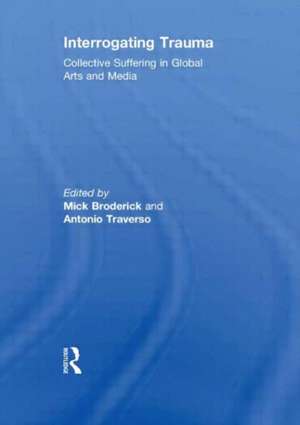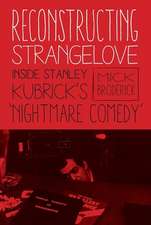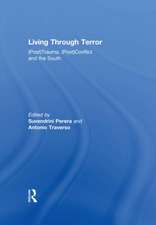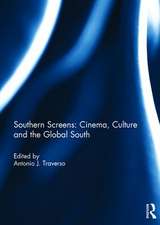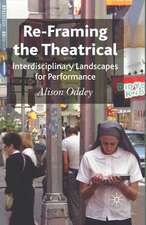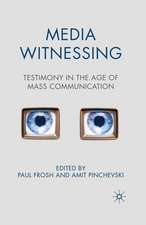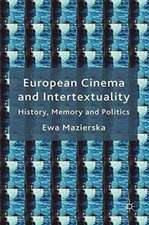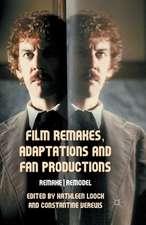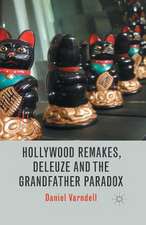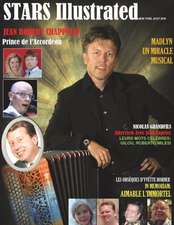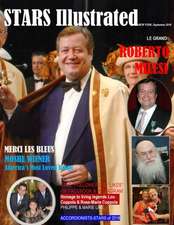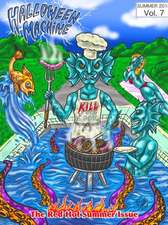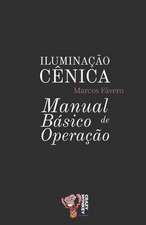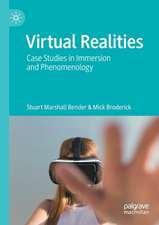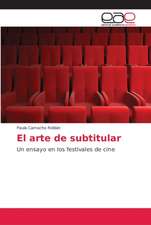Interrogating Trauma: Collective Suffering in Global Arts and Media
Editat de Mick Broderick, Antonio Traversoen Limba Engleză Paperback – 15 feb 2013
This book considers traumatic histories internationally in a broad range of creative arts and visual media representations. Deploying diverse applications of the conventional theories of trauma, it examines the theoretical limitations at the same time as considering alternative methodologies. Interrogating Trauma is concerned with the examination of the concept of trauma, and how it is (often unproblematically) used to theorise the cultural representation of disaster and atrocity. It offers a theorisation of trauma, in order to reappraise the relationship between cultural representation and the socio-historical processes which are marked by violence, conflict and suffering.
This book was published as a special issue of Continuum: Journal of Media and Cultural Studies.
Preț: 400.85 lei
Nou
Puncte Express: 601
Preț estimativ în valută:
76.71€ • 83.30$ • 64.44£
76.71€ • 83.30$ • 64.44£
Carte tipărită la comandă
Livrare economică 22 aprilie-06 mai
Preluare comenzi: 021 569.72.76
Specificații
ISBN-13: 9780415845328
ISBN-10: 0415845327
Pagini: 222
Ilustrații: 13 black & white illustrations
Dimensiuni: 174 x 246 x 15 mm
Greutate: 0.41 kg
Ediția:1
Editura: Taylor & Francis
Colecția Routledge
Locul publicării:Oxford, United Kingdom
ISBN-10: 0415845327
Pagini: 222
Ilustrații: 13 black & white illustrations
Dimensiuni: 174 x 246 x 15 mm
Greutate: 0.41 kg
Ediția:1
Editura: Taylor & Francis
Colecția Routledge
Locul publicării:Oxford, United Kingdom
Public țintă
PostgraduateCuprins
1. Interrogating trauma: Towards a critical trauma studies - Mick Broderick and Antonio Traverso 2. 'Caché': Or what the past hides - Susannah Radstone 3. Torturous dialogues: Geographies of trauma and spaces of exception - Suvendrini Perera 4. Moving testimonies and the geography of suffering: Perils and fantasies of belonging after Katrina - Janet Walker 5. After the Apology: Re-framing violence and suffering in 'First Australians', 'Australia', and 'Samson and Delilah' - Felicity Collins 6. Confronting ‘choiceless choices’ in Holocaust videotestimonies: Judgement, ‘privileged’ Jews, and the role of the interviewer - Adam Brown 7. The guilt zone: Trauma, masochism and the ethics of spectatorship in Brian De Palma’s 'Redacted' - Mark Straw 8. When places have agency: Roadside shrines as traumascapes - Catherine Ann Collins and Alexandra Opie 9. Trauma, bodies, and Performance Art: Towards an embodied ethics of seeing - Sophie Oliver 10. Poetic witnessing in the archive: The database narrative of 'Life After Wartime' - David Carlin 11. Bearing witness to the trauma of slavery in Kara Walker’s videos: 'Testimony', 'Eight possible beginnings', and 'I Was Transported' - Vivien Fryd 12. Depiction or erasure? Violence and trauma in contemporary Peruvian film - Iliana Pagán-Teitelbaum 13. Dictatorship memories: Working through trauma in Chilean post-dictatorship documentary - Antonio Traverso
Descriere
There is now a significant body of theory across academic disciplines focussed on the representation of cataclysmic European and US historical events. This book examines the concept of trauma by deploying diverse applications of conventional trauma theories. It examines the limitations of these theories while advancing alternative conceptual and methodological possibilities.
This book was published as a special issue of Continuum: Journal of Media and Cultural Studies.
This book was published as a special issue of Continuum: Journal of Media and Cultural Studies.
